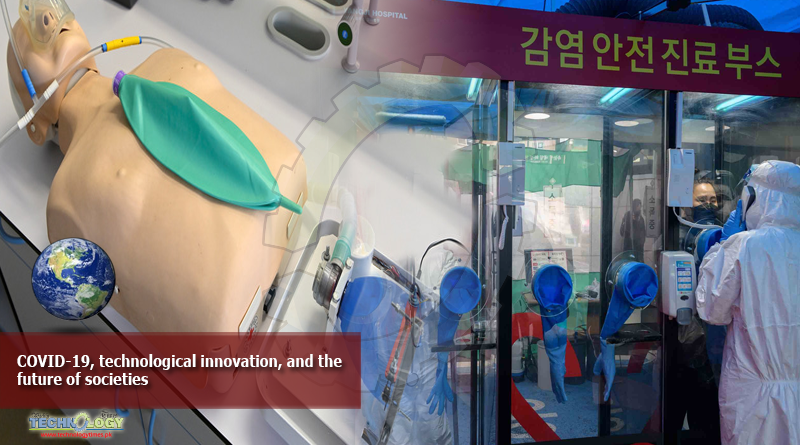Two weeks ago, the Atlantic Council’s GeoTech Center asked technology experts about their expectations of how the novel coronavirus will affect technological innovation (results and analysis here.

In our ongoing effort to aggregate expert opinion on future trends in technology and geopolitics, the same group of experts was polled again, this time about how COVID-19 and technological innovation will shape the future of societies and their forms of government. Like last time, participation was voluntary and anonymous, and each question enjoyed a response rate well over 90% from close to a 100 participants.
Key Findings
Respondents were split on how COVID-19 would impact different governments. Most believed that open societies would be weakened and autocratic regimes strengthened, though a significant minority believed the opposite (see figure 1). Expectations of how technological innovation in different fields would affect the two forms of government were similarly divided (see figure 2). Respondents believed that innovation in the fields of work, data and AI, trust and supply chains, and medical technologies would strengthen open societies. Conversely, they predicted that innovation in the future of work and in trust and supply chains would weaken autocratic regimes. Their opinions on the effect of data and AI as well as health innovation on autocracies, however, diverged (see figure 2). Almost all experts furthermore agreed that innovation in the future of space would have little to no effect on either form of government.
Respondents anticipated that, in the near future, geopolitical trajectories would increase international cooperation significantly in health technologies, moderately in data and AI, slightly in the future of work, and negligibly in space. They also indicated that international cooperation in trust and supply chains might be moderately hindered (see figure 3). Experts also expected that geopolitics would increase private sector cooperation significantly in health technologies, moderately in the future of work and in data and AI, and negligibly in space technologies as well as trust and supply chains. Notably, while respondents agreed that geopolitics wouldn’t alter private cooperation in space technologies, they disagreed about its effect on trust and supply chains—about half believed private cooperation in the field will be hindered, and half predicted its increase. Only answers about space technologies were unimodal, though few bimodal distributions were symmetric (see figure 3 for respective symmetric bimodal, skewed bimodal, and unimodal examples).
When asked about the impact of innovation on regional employment numbers, respondents mostly anticipated slight to moderate increases in unemployment in China, Russia, the Middle East, Latin and South America, as well as Africa. Their opinions on Western nations were less consistent. Once again, responses were distributed bimodally, predicting either a moderate increase or decrease in unemployment, split evenly for the United States and skewed slightly towards unemployment for the UK, Canada, Australia, New Zealand, and the European Union. They anticipated similar trends in Singapore, Japan, South Korea, India, and Southeast Asia in general, though a significant share of respondents anticipated little to no effect there as well (see figure 4 for examples of the three different distributions).
Experts also anticipated innovation to cause moderate decentralization in the United States, the UK, Canada, Australia, New Zealand, and the EU; moderate centralization in China, Russia, the Middle East, Latin and South America, India, Southeast Asia, and Africa; and little to no change in Singapore, Japan, or South Korea. Respondents further believed that the best nation-state responses to new technologies would involve slight-to-moderate increases in regulation, though a significant minority preferred deregulation instead (see figure 5).
Last, experts indicated in which technology field each sector would drive the most innovation. Many responses predicted that open source frameworks would create innovation in the future of data and AI, national public sectors in health, multinational research partnerships in both, and international corporations as well as global private sector cooperation in the future of trust and supply chains (see figure 6).
Behind the Data
Some of the gaps in this survey are familiar themes from the last one we did. Experts still can’t see space innovation affecting much, not even international cooperation. They also don’t leave room for the developing world in the future of innovation, even though it would be worth considering what more meaningful role it could play than to retread the path of whatever innovation leaders it is most closely aligned with. It goes without saying that the addition of nearly half the planet’s population to the information economy will affect innovation deeply, and developing countries’ decisions about the role of government in these emerging technologies will shape the future of nation-state institutions as much as choices in the rest of the world.
Ultimately, this survey is a tale of two ways of governing: open societies and autocracies. Some experts think the former will fare better, some the latter, and both pit the two against each other. Responses received with regard to regional questions exemplified that many arrange the world around an ideological dichotomy dominated by the United States on one end and China on the other (read another GeoTech publication about the Price of Great Power Politics for further information). They believe that autocracies are best situated to capitalize on disruptions technological innovation, while open societies are most likely to benefit from innovations, following the idea that one system’s loss is inevitably the other system’s gain.
It is also worth noting that survey respondents showed persistent optimism towards technology and its impact on Western democracies. Experts who didn’t predicted an inverse relationship between potential impacts and different forms of government, while some just expect both government models to be strengthened (see figure 7). Likewise, respondents only saw the possibility for technology to reduce unemployment in Western nations, and the lone technological field they believed might strengthen autocratic regimes—the future of data and AI—is colored by its implications for surveillance. While technology is neither inherently good nor bad, survey respondents seem to believe its impact, at the very least, is aligned with the values of open societies.
This isn’t a new phenomenon: social media was championed as the epitome of democratic expression amid the Arab Spring and other Twitter-borne protests in the early 2010’s before its potential for misinformation in the second half of the decade cast it in a more cynical light. The overall uncertainty of respondents though—the surplus of bimodal distributions and misleading averages—underscores the importance of guiding innovation with policy. Many saw two futures for open societies, and it is up to policy makers and their respective societies to choose which becomes real.
Originally Publish at: https://www.atlanticcouncil.org/
